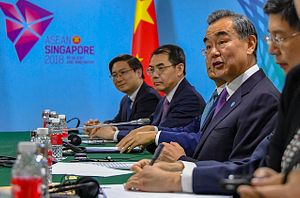Opening the recent ASEAN Foreign Ministers’ Meeting, Singaporean Foreign Minister Vivian Balakrishna chose to quote Henry A. Kissinger’s words, “We are in a very, very grave period.”
The recent round of ASEAN conferences clearly showed that Balakrishna’s concerns are not misplaced. ASEAN faces numerous issues, including terrorism, cyber security, the ASEAN Economic Community (AEC) and the Regional Comprehensive Economic Partnership (RCEP). Right now, though, the most critical question is whether ASEAN is able to approach regional politics as an independent entity and continue to exert at least some influence as the clash of interests between the United States and China escalates and the two powers seek to strengthen their sway over its member states.
Take the recent outreach from Washington and Beijing to ASEAN. On July 30, U.S. Secretary of State Mike Pompeo announced the establishment of funds for infrastructure development in the Indo-Pacific region, revealing U.S. plans to contribute $113 million and stating that the U.S. would work with Japan and Australia to develop infrastructure in the Indo-Pacific region. Pompeo also announced that the U.S. would contribute $300 million to assist in security in the Indo-Pacific region, including maritime security, humanitarian relief and peace-building.
Meanwhile, the recent China-ASEAN Foreign Ministers’ meeting announced an agreement to lay the groundwork for negotiations on a Code of Conduct in the South China Sea (COC). According to Chinese Foreign Minister Wang Yi, “Ruling out external disturbances, the deliberation of the code of conduct will speed up and move forward.” The implication was clear: U.S. engagement in the South China Sea issue was an obstacle to solving the issue. Two days later, Wang insisted that the militarization of China in the South China Sea was intended to defend its sovereignty and territories from “non-regional countries, especially the United States.”
In addition, while the series of ASEAN meetings were taking place, China and ASEAN member states were conducting a joint tabletop exercise for maritime security at Changi Naval Base. In October this year, Singapore and China will hold the first ever China-ASEAN joint military exercise. Additionally, according to media reports, China proposed regular joint military exercises with ASEAN in the future, and China has even asked ASEAN member states not to conduct joint military exercises with “non-regional countries” without prior consultation.
To a significant degree, these initiatives by Washington and Beijing to bring ASEAN member states to their side have defined the atmosphere at the recent ASEAN meetings. Of course, great power rivalry doesn’t always need to be negative for ASEAN member states. The diplomatic challenge for small countries is always to strike a balance in their relationships with clashing major powers. ASEAN has also followed this path. ASEAN centrality is, after all, the product of ASEAN member states coming together as a group of smaller countries.
But China’s policy of actively increasing its economic and political influence, with intentions that are quite clear, is what is making the current situation so uncertain for ASEAN members. Of course, one can easily argue that China’s increasingly robust approach to ASEAN reveals Beijing’s worry that if ASEAN were to confront China as a unified bloc, it would be challenging enough to put pressure on Chinese behavior. At any rate, China’s direct approach to ASEAN is escalating to a degree that goes well beyond anything seen in recent history.
In addition, although Pompeo stressed U.S. engagement in Asia, as a great power seeking to exert pressure on China, Washington will not always act in a way that is in the best interests of ASEAN member states. For example, the protectionist “America First” policies of the Trump administration are aimed at China, yet Trumpian diplomacy is so unpredictable that ASEAN could well find itself caught in the crossfire. Even if this U.S. policy unpredictability continues for just a few years, China will use that time to redouble its efforts to bring ASEAN member states into its orbit. That could very well in turn see some countries turning to Japan to some degree, as a third option. Right now, though, Japan is focusing on improving its relations with China, and more fundamentally, it simply does not have the power to pressure China in either security or economic terms.
In his speech, Balakrishnan quoted the words of Sinnathamby Rajaratnam, the Singaporean foreign minister at the time ASEAN was founded. “If we do not hang together, we will all hang separately.” It was a call for ASEAN solidarity in the current context. Ultimately, however difficult it may be, ASEAN member states have little choice but to hew to this advice in their regional diplomacy, if they are to maintain their independence and influence in the long term.
Mie Oba is a professor at the Tokyo University of Science.

































